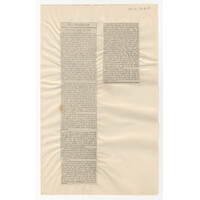Untitled
Metadata
Untitled
Publications & Reports
Bleek writes that judges hold unique authority in the Cape public's imagination, surpassing the Governor's or any other official's. This almost superstitious reverence is a view shared by Malay coachmen and colonists alike. This view does not arise from anyone's love of justice but from a judge's inherent power to force compliance and render judgment upon the guilty that may divest them of rights or even their life. When legitimately exercised, judges wield unflinching power over life and death irrespective of power or class. Unlike other state functionaries, they operate under a presumption of impartiality. Concern about hurting their feelings prevents the free and fearless discussion of their decisions, which is the duty of the Fourth Estate as a watchdog. Unlike the sensitive Chief Justice (William Hodges), Justice Bell boasts of his indifference toward media scrutiny. When irate clergy denounce the press, consumers withdraw their subscriptions, but Hodges ludicrously threatens legal action. Hodges's "legal procrastination" has upset the litigants of his undecided cases. The media's coverage of unhappy litigants does not undermine Hodges or the courts but conveys how desperate litigants are for him to preside over their cases. Lastly, his temper and injudicious address in Oudtshoorn also marred his professionalism.
Printed newsprint glued on paper
10/04/1866
Two cut out columns of newsprint text, positioned vertically parallel, pasted onto a plus-sized A4 unlined sheet with visible warping. No title was subsequently handwritten onto the mount/paper backing.


Contributions